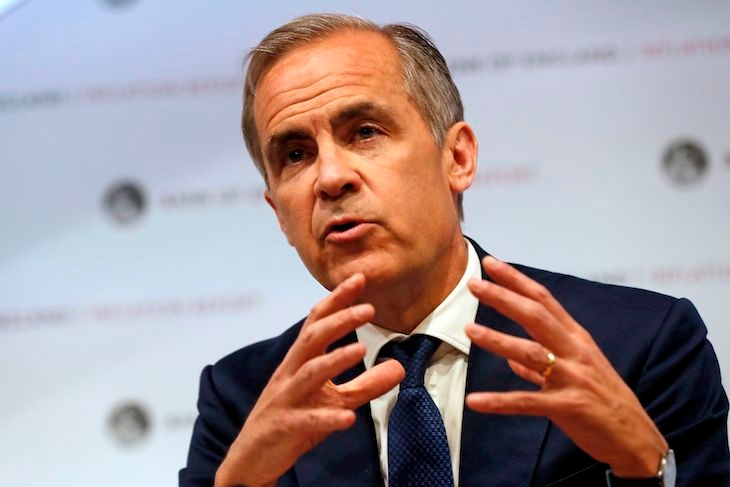Soon after he became his party’s leader, David Cameron spoke dismissively of Conservatives who ‘bang on about Europe’. He had a point. The subject has a peculiar ability to turn intelligent people into crashing bores who obsess over Europe to the exclusion of all else. Often, the subject warps good judgment. Since the referendum, this phenomenon has become much worse.
Take the Bank of England governor, Mark Carney. Twice this week, he has claimed that households are £900 worse off as a result of the referendum. Why? Because his officials had overestimated salary growth, and he sees the Brexit vote as an explanation for their error. This is odd. Given that the Bank has been getting its forecasts wrong for years, why blame Brexit?
But Mr Carney is right in one regard. Almost two years have passed since the vote, so we can now look at forecasts made at the time and compare them with the outcome. And, perhaps, see if there are lessons to learn.
In a speech this week, Mr Carney boasted that the Bank of England’s Monetary Policy Committee had predicted a drop in the pound after the referendum. “That is exactly what has happened” he said. But he didn’t mention its other forecasts. Take, for example, its post-referendum forecast that exports would fall by 0.5 per cent in 2017 – a baffling assumption given that the (welcome) fall in the pound was always likely to boost exports. In fact, exports went on to rise by 7.2 per cent. Carney’s forecasters also envisaged a 2 per cent drop in business investment. The opposite happened: it rose by more than 2 per cent. Foreign direct investment also hit a record high.
The Bank’s rather hysterical claim that up to 10,000 City jobs would be lost before Britain leaves the EU now seems to be twice the real number, perhaps more. After the referendum, the Bank of England forecast that employment growth would stop altogether: a supposed killer Brexit effect. Why on earth make such an assumption? The Bank’s intelligence network did not pick up that the employment boom had barely paused for breath: 320,000 jobs were created last year, even more than the Bank had envisaged in its rosy forecast before the vote. The boom continues, with 197,000 jobs created in the first three months of this year alone, forcing unemployment to its lowest since 1975. How could the Bank have missed so big a trend?
Mr Carney made the great mistake of taking sides during the referendum. He was personally recruited by George Osborne for this job, and may well have felt honour-bound to help the government when it was making a purely economic case against Brexit. He ought to have confined himself to saying that the Bank stood ready for all eventualities.
Even now, Mr Carney talks in the partisan language, referring to a “cliff-edge” Brexit and assuming that the rosy forecasts made before the referendum would have come to pass had the British public not voted in a way that his economists did not expect. Since 2006, the Bank of England has been routinely making overly-optimistic forecasts for the economy and has had to revise them down quite regularly.For each of the last eight years, economists have badly overestimated salary growth – usually by a margin greater than £900 a year. But now, suddenly, all forecasting errors are being described as the a Brexit effect.
He refers to the 15pc fall in pound as “referendum-induced”. The IMF pointed out before the referendum that the pound was about 13 per cent overvalued.

This anomaly was corrected at the time of the referendum, but is the problem was not the Brexit vote. The problem was that pound had been too high for too long.
Mr Carney’s £900 point – a piece of spin which given to both MPs and in a speech to the Society of Professional Economists – could have come from the George Osborne playbook of referendum campaign deception. Household disposable incomes have risen to a record high since the Brexit vote, so how can he talk as if people are poorer? By comparing one set of growth assumptions with another, then converting the percentage growth figures into cash to give the impression that people are somehow worse off. This is precisely the trick that Mr Osborne deployed to claim that a Brexit vote would make households £4,300 worse-off. Polls later showed that this figure was widely disbelieved, and the whole stunt deeply damaged the Remain campaign’s credibility. For Mr Carney to use the same techniques now brings obvious risks to the Bank of England’s credibility.
The Bank of England chief economist, Andy Haldane, recently offered a more honest assessment: the forecasters have experienced their ‘Michael Fish moment’. He was comparing their errors to the evening in October 1987 when the BBC weatherman poured scorn on reports that a hurricane was on the way. The Met Office learned from that mistake, revised and improved its methods. Mr Carney would be well advised to do the same.






Comments